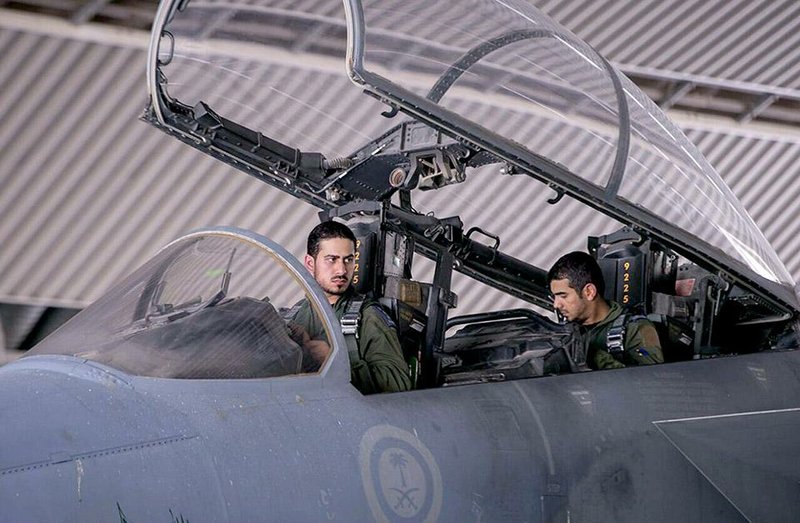BEIRUT -- U.S. fighter jets and bombers struck Islamic State militant positions on both sides of the Syrian-Iraqi border Wednesday as the extremists pressed their offensive in Kurdish areas within sight of the Turkish border, where fleeing refugees told of civilians beheaded and towns torched.
RELATED ARTICLES
http://www.arkansas…">Obama urges world to fight Islamic Statehttp://www.arkansas…">French hostage beheadedhttp://www.arkansas…">U.S. sanctions 12 over terrorist ties
Wednesday's strikes marked the second day of a broadened U.S. military operation against the Islamic State group after more than 200 strikes on some two dozen targets in Syria a day earlier. That campaign, which the White House has warned could last years, builds upon the air raids the U.S. had already been conducting for more than a month against the extremists in Iraq.
The ultimate aim of President Barack Obama's administration and its Arab partners is to destroy the Islamic State extremist group, which through brute force has carved out a proto-state on lands it controls in Iraq and Syria. Along the way, the extremist faction has massacred captured soldiers, terrorized religious minority groups and beheaded two American journalists and a British aid worker.
U.S. allies lined up in support of the aerial campaign Wednesday. The Dutch government announced it would send six F-16 fighter jets along with 250 pilots and support staff personnel to strike at Islamic State targets in Iraq, and British Prime Minister David Cameron's office said Parliament had been recalled to debate Britain's response to a request to support the airstrikes.
U.S. and coalition forces hit a dozen targets in Syria that included small-scale oil refineries that have been providing millions of dollars a day in income to the Islamic State, the U.S. Central Command said. Saudi Arabia and the United Arab Emirates took part, along with U.S. aircraft.
Earlier, U.S. strikes damaged Islamic State vehicles in Syria near the Iraqi border town of Qaim, the U.S. Central Command said. It also reported hitting two Islamic State armed vehicles west of Baghdad, as well as two militant fighting positions in northern Iraq.
In a separate statement, Pentagon spokesman Rear Adm. John Kirby said the strikes in eastern Syria hit a staging area used by the militants to move equipment across the border into Iraq.
Despite the start of the coalition campaign, Islamic State fighters continued their advance against Syrian Kurdish militiamen around the town of Ayn Arab, known to Kurds as Kobani, near the Turkish border, where refugees fleeing into Turkey reported the beheading of captives and the torching of homes.
A Kurdish militiaman fighting to protect the city said Islamic State militants were less than half a mile from the outskirts Wednesday.
Weary refugees arriving in Turkey described atrocities at the hands of the Islamic State militants. Osman Nawaf, 59, said he saw about 50 bodies hanging headless in the village of Boras when he passed it on his three-day walk from a village on the outskirts of Kobani.
In the opening salvo of the air campaign inside Syria on Tuesday, the U.S. also hit al-Qaida's Syria branch, known as the Nusra Front. American officials said the strikes targeted the group known as Khorasan, a cell within the Nusra Front made up of hardened jihadis they said pose a direct and imminent threat to the United States.
On Wednesday, the Nusra Front said it was evacuating its compounds near civilian areas in Idlib and Aleppo provinces in northern Syria, according to the Aleppo Media Center activist group. The decision followed a U.S. airstrike on a Nusra Front base in the village of Kfar Derian that killed around a dozen fighters and 10 civilians, activists said.
Another Syrian rebel group, Ahrar al-Sham, was also clearing out of its bases, according to the Syrian Observatory for Human Rights, an organization based in Britain that monitors the conflict in Syria through a network of contacts in the country. It said the group issued a statement calling for fighters to limit the use of wireless communication devices to emergencies, to move heavy weapons and conceal them and to warn civilians to stay away from the group's camps.
Ahrar al-Sham has been among the most effective forces fighting to oust Assad in Syria's civil war and has also been on the front lines of a nine-month battle against the Islamic State group. But the U.S. has long looked askance at Ahrar al-Sham, considering it too radical and too cozy with the Nusra Front.
An activist in Idlib who goes by the name of Mohammed confirmed the Ahrar al-Sham evacuations. He did not know of any strikes against the group but said the fighters thought they would be targeted by the U.S.-led coalition because of their ultraconservative Islamic beliefs.
Information for this article was contributed by Diaa Hadid and Desmond Butler of The Associated Press.
A Section on 09/25/2014



